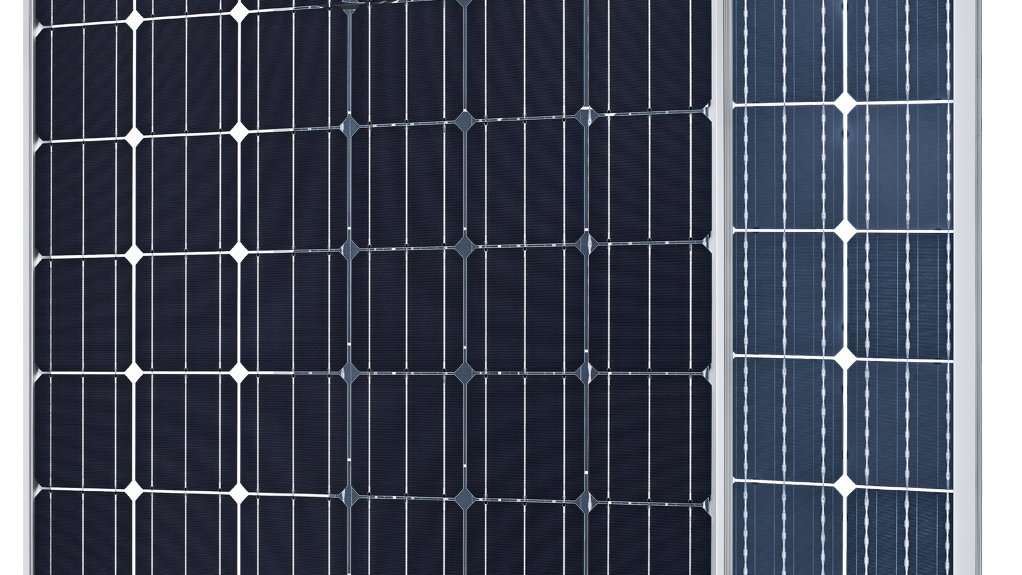Government support imperative for solar energy in South Africa


SUNMODULE BISUN Solar power generated through innovative technology is a valuable resource in South Africa
One of the biggest challenges hindering large projects in the commercial and industrial sectors in South Africa is the lack of a legal framework enabling the production of alternative sources of energy, says photovoltaic module manufacturer SolarWorld Africa MD Gregor Kuepper.
He believes that legal and governmental support would increase the opportunities for homeowners and commercial businesses to integrate solar electricity into their daily energy use. “While many individuals and businesses are aware of the benefits of solar power, they are hesitant to implement it, owing to the large amount of red tape that governs it . . .”
SolarWorld’s products have been implemented successfully in commercial environments that require constant energy supply, such as cooling facilities, shopping centres and large manufacturing companies. The company’s clients include mobile operator Vodacom, tea producer Rooibos, retailer Shoprite Checkers and some of the larger wineries in the country. Moreover, in November, the company supplied 4 200 solar modules to the Victoria and Alfred Waterfront, in Cape Town.
“We can see that an acceptance of solar energy exists, but, often, it requires some time and preparation to convince bodies such as municipalities to support its implementation,” says Kuepper.
He explains that a key problem with solar energy for residential users is what to do with excess solar energy generated during the day. “Solar is not necessarily cost effective if you have to store it in batteries . . . Ecologically and economically, the best way for solar to work is for the electricity to be consumed as it is produced or to create a mechanism that allows the producer to feed the energy back into the grid and receive compensation.”
Kuepper further indicates that businesses that do not operate seven days a week face a similar problem, as solar implementation becomes a costly exercise because there is no economic compensation for the excess energy produced over the weekend.
He believes that the best way to increase the implementation of solar energy is through net metering, where solar energy system owners can add the excess energy they produce to the grid and be credited for it. Kuepper is optimistic about the future of solar energy in the country and says the topic is undergoing serious discussion by the relevant bodies to implement regulations that support its implementation in the near future.
“If you compare the cost of grid electricity with the cost of 1 kWh of usable solar energy, it is absolutely inevitable that more people are going to go ahead with implementing photovoltaic modules in their homes and businesses,” Kuepper says.
He adds that an increase in solar energy use in South Africa will enable the country to reap all the benefits of a decentralised power supply system, where electricity is generated close to the site at which it is consumed. The decentralisation of power allows for a large capacity of energy to be rolled out in a substantially shorter time frame, and eradicates transmission losses and the need for upgrading and maintaining long-distance transmission lines.
Moreover, SolarWorld, whose products are manufactured in Germany and the US, will exhibit its range of solar power solutions at this year’s African Utility Week, in Cape Town, from May 17 to 19. The company’s main attraction at the exhibition will be its new bifacial technology, Sunmodule Bisun, which allows for both sides of solar panels to be activated to collect direct sunlight on one side and reflected irradiation on the other. This result is a power yield boost of up to 25%.
While this technology is not new to the industry, Kuepper says, SolarWorld has developed a roll-out design that is more cost effective than its competitors.
Kuepper praises African Utility Week, saying that it provides an important opportunity for the company to connect with potential partners and customers. He highlights its value as an information-sharing platform, through which the company is granted space to educate partners and customers about solar energy production and emphasise its value in solving a number of South Africa’s power supply problems.
Comments
Press Office
Announcements
What's On
Subscribe to improve your user experience...
Option 1 (equivalent of R125 a month):
Receive a weekly copy of Creamer Media's Engineering News & Mining Weekly magazine
(print copy for those in South Africa and e-magazine for those outside of South Africa)
Receive daily email newsletters
Access to full search results
Access archive of magazine back copies
Access to Projects in Progress
Access to ONE Research Report of your choice in PDF format
Option 2 (equivalent of R375 a month):
All benefits from Option 1
PLUS
Access to Creamer Media's Research Channel Africa for ALL Research Reports, in PDF format, on various industrial and mining sectors
including Electricity; Water; Energy Transition; Hydrogen; Roads, Rail and Ports; Coal; Gold; Platinum; Battery Metals; etc.
Already a subscriber?
Forgotten your password?
Receive weekly copy of Creamer Media's Engineering News & Mining Weekly magazine (print copy for those in South Africa and e-magazine for those outside of South Africa)
➕
Recieve daily email newsletters
➕
Access to full search results
➕
Access archive of magazine back copies
➕
Access to Projects in Progress
➕
Access to ONE Research Report of your choice in PDF format
RESEARCH CHANNEL AFRICA
R4500 (equivalent of R375 a month)
SUBSCRIBEAll benefits from Option 1
➕
Access to Creamer Media's Research Channel Africa for ALL Research Reports on various industrial and mining sectors, in PDF format, including on:
Electricity
➕
Water
➕
Energy Transition
➕
Hydrogen
➕
Roads, Rail and Ports
➕
Coal
➕
Gold
➕
Platinum
➕
Battery Metals
➕
etc.
Receive all benefits from Option 1 or Option 2 delivered to numerous people at your company
➕
Multiple User names and Passwords for simultaneous log-ins
➕
Intranet integration access to all in your organisation



















